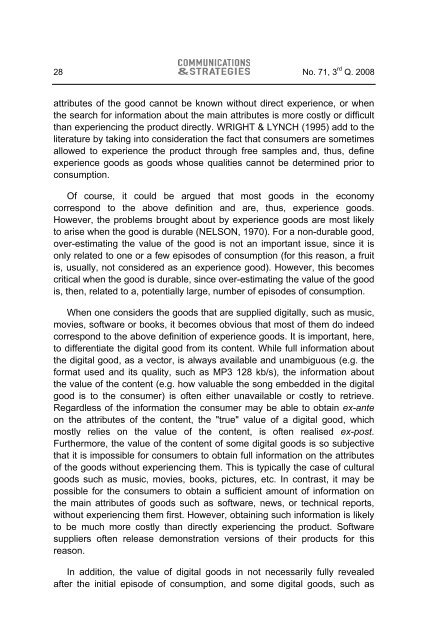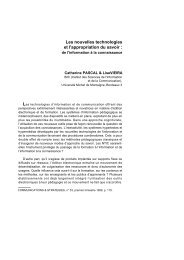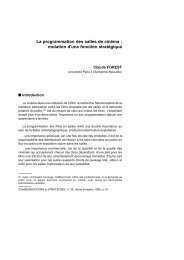The Nature of Digital Goods - Idate
The Nature of Digital Goods - Idate
The Nature of Digital Goods - Idate
Create successful ePaper yourself
Turn your PDF publications into a flip-book with our unique Google optimized e-Paper software.
28 No. 71, 3 rd Q. 2008<br />
attributes <strong>of</strong> the good cannot be known without direct experience, or when<br />
the search for information about the main attributes is more costly or difficult<br />
than experiencing the product directly. WRIGHT & LYNCH (1995) add to the<br />
literature by taking into consideration the fact that consumers are sometimes<br />
allowed to experience the product through free samples and, thus, define<br />
experience goods as goods whose qualities cannot be determined prior to<br />
consumption.<br />
Of course, it could be argued that most goods in the economy<br />
correspond to the above definition and are, thus, experience goods.<br />
However, the problems brought about by experience goods are most likely<br />
to arise when the good is durable (NELSON, 1970). For a non-durable good,<br />
over-estimating the value <strong>of</strong> the good is not an important issue, since it is<br />
only related to one or a few episodes <strong>of</strong> consumption (for this reason, a fruit<br />
is, usually, not considered as an experience good). However, this becomes<br />
critical when the good is durable, since over-estimating the value <strong>of</strong> the good<br />
is, then, related to a, potentially large, number <strong>of</strong> episodes <strong>of</strong> consumption.<br />
When one considers the goods that are supplied digitally, such as music,<br />
movies, s<strong>of</strong>tware or books, it becomes obvious that most <strong>of</strong> them do indeed<br />
correspond to the above definition <strong>of</strong> experience goods. It is important, here,<br />
to differentiate the digital good from its content. While full information about<br />
the digital good, as a vector, is always available and unambiguous (e.g. the<br />
format used and its quality, such as MP3 128 kb/s), the information about<br />
the value <strong>of</strong> the content (e.g. how valuable the song embedded in the digital<br />
good is to the consumer) is <strong>of</strong>ten either unavailable or costly to retrieve.<br />
Regardless <strong>of</strong> the information the consumer may be able to obtain ex-ante<br />
on the attributes <strong>of</strong> the content, the "true" value <strong>of</strong> a digital good, which<br />
mostly relies on the value <strong>of</strong> the content, is <strong>of</strong>ten realised ex-post.<br />
Furthermore, the value <strong>of</strong> the content <strong>of</strong> some digital goods is so subjective<br />
that it is impossible for consumers to obtain full information on the attributes<br />
<strong>of</strong> the goods without experiencing them. This is typically the case <strong>of</strong> cultural<br />
goods such as music, movies, books, pictures, etc. In contrast, it may be<br />
possible for the consumers to obtain a sufficient amount <strong>of</strong> information on<br />
the main attributes <strong>of</strong> goods such as s<strong>of</strong>tware, news, or technical reports,<br />
without experiencing them first. However, obtaining such information is likely<br />
to be much more costly than directly experiencing the product. S<strong>of</strong>tware<br />
suppliers <strong>of</strong>ten release demonstration versions <strong>of</strong> their products for this<br />
reason.<br />
In addition, the value <strong>of</strong> digital goods in not necessarily fully revealed<br />
after the initial episode <strong>of</strong> consumption, and some digital goods, such as





